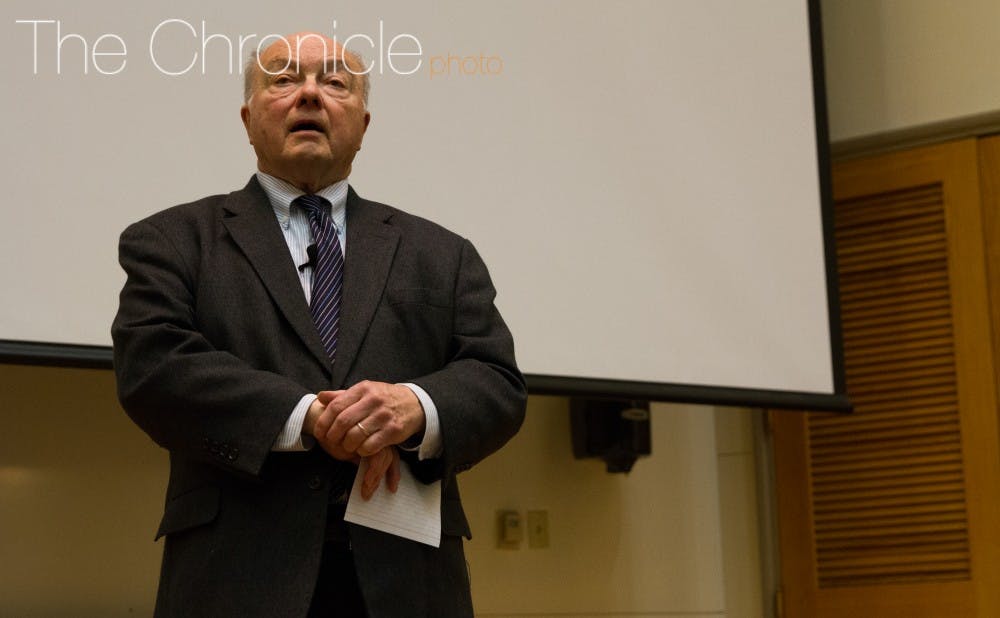Jack Matlock, a former U.S. ambassador to the Soviet Union during the Cold War, discussed the the future of U.S.-Russia relations under Donald Trump’s presidency Monday evening.
A crowd of about 100 people gathered in White Lecture Hall to listen to Matlock's perspective on Russia and the U.S. under the leadership of Russian president Vladimir Putin and President-elect Donald Trump. He noted that there are parallels between the United States' and Russia's current, conflict-ridden relations and the legacy of the Cold War.
“I have to be very modest about my ability to predict,” Matlock said. “When I was ambassador to the Soviet Union, people often would come to me and ask me, well what’s going to happen about this, what’s going to happen about that, and I had a standard answer. I would say, I don’t know what’s going to happen. When it happens, I’ll be happy to explain to you why it was inevitable.”
Throughout the lecture, Matlock discussed the similarities and differences between the current state of international relations and the former tensions between the two powers.
“The genie we thought we put in a pretty tight bottle in 1991 is beginning to grow again,” Matlock said of the tensions between the U.S. and the Soviet Union at the end of the Cold War.
Matlock noted that it is in both nation's interests to avoid conflict, as nuclear war could lead to the destruction of both nations and potentially humanity as a whole. Other shared national interests include dealing with health issues, environmental issues, terrorism and failed states.
Matlock also challenged common American negative perceptions of Russia regarding its policies and violation of laws. He noted that since 1991, the United States was the first to violate international law with its involvement in the 1999 North Atlantic Treaty Organization bombing of Yugoslavia over Kosovo without United Nations approval.
“We’re setting precedents that can come back to haunt us,” Matlock said. “And then if you want to talk about it, aggression and the violation of international law, nothing Russia has done approaches the seriousness of the American invasion of Iraq.”
This way of viewing U.S.-Russia relations struck a chord among some attendees, serving as a fresh perspective on normalized attitudes about Russia.
“I just found it interesting in general how he spoke more from Russia’s side than the more traditional American perspective,” said first-year Semhal Araya.
In terms of Russia and Ukraine, Matlock said he believes that the U.S. is getting in fight where it does not belong, making the situation more difficult.
“We never owned Ukraine. It was never ours to give or to take, and as I may have mentioned before, for several centuries of history, it had no relevance to American national security whether Ukraine was in Russia or somewhere else,” Matlock said. “Fifty years from now, probably nobody except the people there will notice if it’s in Russia or Ukraine. I think we have to put it in perspective.”
As for his advice for the next administration, Matlock said that president-elect Donald Trump should convince Putin that NATO will not add any further countries near Russia. Improving relations with Russia would help both countries, he noted.
Matlock’s perspective on the United States’ role in Russia’s interactions with Ukraine, Crimea and Syria was a more controversial point among attendees.
“I was disappointed in his response about the [International Criminal Court]—kind of the 'we need to let Syria and Ukraine be and if the genocides happen then that’s how history has to unfold,'” said Jessica Gokhberg, a third-year Ph.D. student in literature.
The event was sponsored by Slavic and Eurasian Studies, the Center for Slavic, Eurasian and East European Studies, the Focus Program and Rubenstein Fellows Academy.
Get The Chronicle straight to your inbox
Signup for our weekly newsletter. Cancel at any time.

